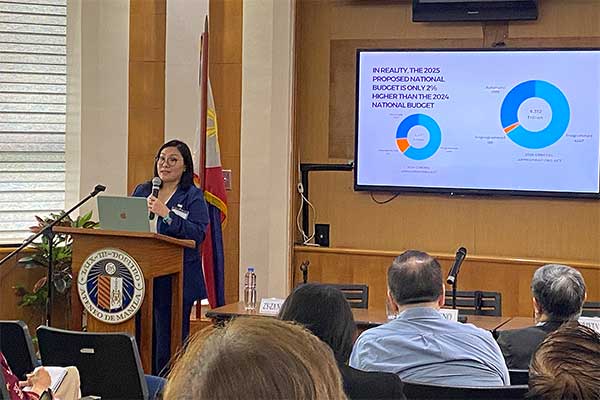
By Joseph Bernard A. Marzan
An economic expert said Thursday, Nov. 14, that the Marcos Jr. administration’s fiscal policy has leaned heavily on discretionary spending.
This focus, according to the expert, has left limited room to enhance public social services.
Speaking at the 23rd Jaime V. Ongpin Annual Memorial Lecture, Zy-za Nadine Suzara criticized the government’s reliance on unprogrammed appropriations (UA) in the General Appropriations Acts (GAA).
The Department of Budget and Management defines UA as standby authority to incur additional obligations for priority programs if revenue targets are exceeded or if additional grants or foreign funds are secured.
Suzara noted that UA levels, which were relatively low from 2010 to 2021, surged starting in 2022.
In the 2024 national expenditure program (NEP), UA was set at 4.6 percent of the proposed P5.767-trillion budget.
However, the approved GAA expanded UA to 11.3 percent of the P6.217-trillion budget.
Funds for UA were reportedly sourced from programmed appropriations in the NEP and unused allocations from government-owned and controlled corporations (GOCCs).
The Supreme Court recently issued a temporary restraining order halting a P29.9-billion transfer from the Philippine Health Insurance Corporation (PhilHealth) to the National Treasury to fund UA.
A provision in the 2024 GAA allowed the Department of Finance (DOF) to redirect unused GOCC funds to the Treasury.
This provision was implemented through Circular No. 003-2024 by Finance Secretary Ralph Recto.
Beyond PhilHealth, another P110 billion from the Philippine Deposit Insurance Corporation (PDIC) was earmarked for transfer to UA.
Suzara argued that reallocating funds to UA allows the government to fund de-prioritized projects without increasing the budget deficit.
However, this practice also inflates the total budget, which she said has become common since 2022.
The 2024 GAA, for instance, is P450 billion higher than the proposed P5.8-trillion executive branch budget.
She described UA as evolving from a reserve fund based on excess revenues and foreign loans to a channel for “pork barrel” spending.
The Supreme Court declared pork barrel allocations unconstitutional in the 2013 Belgica vs. Ochoa case.
“What they do is put all of the pork projects in programmed appropriations, carve out space from agencies’ programmed budgets, shift priority projects to unprogrammed appropriations, and [then] increase the budget,” Suzara said.
She noted the lack of guaranteed financing for priority projects, including flagship initiatives outlined by Marcos Jr. in his State of the Nation Addresses.
PhilHealth’s appropriations for 2024 were slashed from the proposed P101.5 billion to P60.5 billion.
The 2025 GAA bill approved by the House of Representatives allocates only P69 billion, down from the Department of Health’s (DOH) proposed P74 billion.
Suzara suggested that the P60 billion cut from PhilHealth could have been used to enhance benefit packages, address delayed reimbursements, or reform internal systems.
In 2021, seven Iloilo City hospitals considered withdrawing their PhilHealth accreditation over P895 million in unpaid reimbursements.
These hospitals ultimately renewed their accreditation in 2022.
The budget cut raises potential violations of the 1987 Constitution, the Universal Healthcare Act, and the Sin Tax Law, according to Suzara.
“It’s a really a problem of inefficiency, and it’s dumbfounding that the solution to those inefficiencies and absorptive capacity problems of PhilHealth is to take out the cash, instead of reforming PhilHealth and putting in place better systems,” she said.
Suzara also highlighted P277 billion cut from the Department of Transportation and P507 billion from Special Purpose Funds (SPF) between fiscal years 2022 and 2024.
These funds were redirected to UA.
Affected programmed projects included the Metro Rail Transit (MRT) Line 4, North-South Commuter Railway System, Metro Manila Subway Project, and Cebu Bus Rapid Transit Project.
Funds from SPF allocations for programs like Universal Access to Tertiary Education, senior citizens’ pensions, and cold storage expansion were also redirected to UA.
The freed budget space was channeled to agencies like the Department of Public Works and Highways for flood control, local roads, and multipurpose halls.
Funds were also allocated to the Department of Health, Department of Social Welfare and Development (DSWD), and Department of Labor and Employment (DOLE) for social aid programs.
These programs include cash assistance initiatives like the DSWD’s Assistance to Individuals in Crisis Situations (AICS) and the DOH’s Medical Assistance to Indigent Patients (MAIP).
DOLE’s emergency employment TUPAD program was also supported through these reallocations.
Suzara criticized the closed-door nature of recent congressional bicameral budget conferences.
She said these sessions enable unaccountable insertions and cuts.
“These are not tied to performance measures. This does not have any objective basis for implementation. For example, a geographic focus for flood control projects, it does not have that, because these are all insertions that happen in the last few days of budget legislation,” she stated.
“What we really have is a patronage-driven budget that exceeds the total fiscal space every year, but has no clear emphasis in supporting the administration’s own strategic development agenda. If they can do it for the big-ticket projects that is listed in the NEDA’s flagship programs, they can do it to the smaller socio-economic [projects],” she added.


















